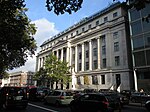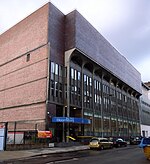University College Hospital
1834 establishments in EnglandAlfred Waterhouse buildingsBuildings and structures in the London Borough of CamdenHealth in the London Borough of CamdenHospital buildings completed in 1906 ... and 6 more
Hospital buildings completed in 2005Hospitals established in 1834NHS hospitals in LondonTeaching hospitals in LondonUniversity College London Hospitals NHS Foundation TrustUse British English from March 2014

University College Hospital (UCH) is a teaching hospital in the Fitzrovia area of the London Borough of Camden, England. The hospital, which was founded as the North London Hospital in 1834, is closely associated with University College London (UCL), whose main campus is situated next door. The hospital is part of the University College London Hospitals NHS Foundation Trust The hospital is on the south side of Euston Road and its tower faces Euston Square tube station on the east side. Warren Street tube station lies immediately west and the major Euston terminus station is beyond 200 metres east, just beyond Euston Square Gardens.
Excerpt from the Wikipedia article University College Hospital (License: CC BY-SA 3.0, Authors, Images).University College Hospital
Byng Place, London Bloomsbury (London Borough of Camden)
Geographical coordinates (GPS) Address Nearby Places Show on map
Geographical coordinates (GPS)
| Latitude | Longitude |
|---|---|
| N 51.525241666667 ° | E -0.13439722222222 ° |
Address
University College London
Byng Place
WC1H 0AW London, Bloomsbury (London Borough of Camden)
England, United Kingdom
Open on Google Maps









